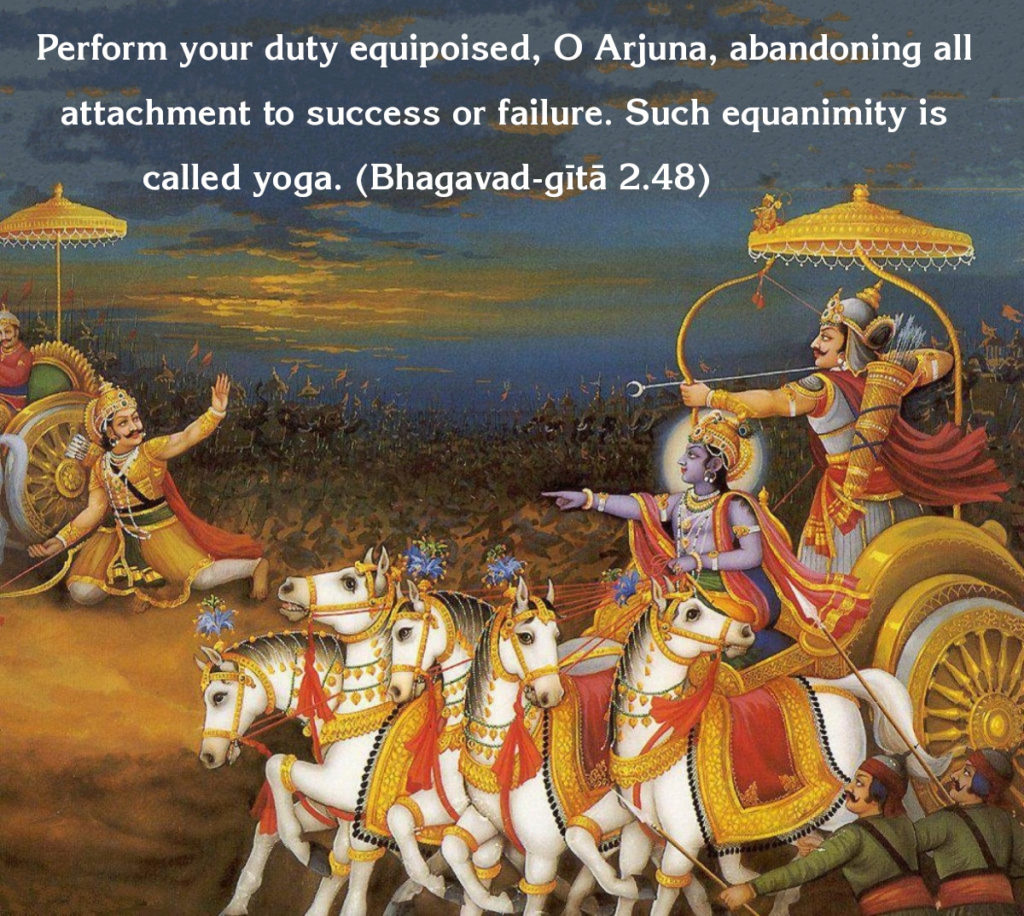योगस्थ: कुरु कर्माणि सङ्गं त्यक्त्वा धनञ्जय |
सिद्ध्यसिद्ध्यो: समो भूत्वा समत्वं योग उच्यते || 48||
yoga-sthaḥ kuru karmāṇi saṅgaṁ tyaktvā dhanañjaya
siddhy-asiddhyoḥ samo bhūtvā samatvaṁ yoga uchyate
yoga-sthaḥ—being steadfast in yog; kuru—perform; karmāṇi—duties; saṅgam—attachment; tyaktvā—having abandoned; dhanañjaya—Arjun; siddhi-asiddhyoḥ—in success and failure; samaḥ—equipoised; bhūtvā—becoming; samatvam—equanimity; yogaḥ—Yog; uchyate—is called
Translation:
O Arjuna! Steadfast in Yoga, giving up all attachment, unmindful of success or failure, do your work. Such equanimity of mind is called Yoga.
Commentary:
The Lord’s command is that man should work, having established himself firmly in Yoga. What is Yoga? Equanimity of mind in success and failure is Yoga. The definition of Yoga should be carefully noted. How can one acquire such perfect mental equilibrium? Such a state can be had only when one transcends the mind and enter the Atmic state. That is the yogic position. The merging of the mind in Atma is Yoga. As this state alone can bring about perfect equanimity, the word Yoga is here applied to samatvam (i.e.) equal-mindedness under all circumstances. Free from any kind of desire, realizing one’s unity with Atma, man should work.
One should cultivate the habit of remaining steadfast in Atma before plunging into work. Godliness and spirituality should permeate the mind. One should feel his identity with the universal Being. Otherwise, the work he does will bind him to the world. The success and failures, losses and failures of his worldly activities disturb the mind by throwing it up in waves of momentary elation and depression and of pride and despondency. So one should deeply think of the Self and discriminate the real from the unreal. Then only a man can work with real detachment and with a steady mind. That is why the Lord first teaches the yoga of self-realisation and next speaks of Karma Yoga.
Sri Ramakrishna Says —
“Go forward. A wood-cutter once entered a forest to gather wood. A brahmachari said to him, ‘Go forward.’ He obeyed the injunction and discovered some sandal-wood trees. After a few days he reflected, ‘The holy man asked me to go forward. He didn’t tell me to stop here.’ So he went forward and found a silver-mine. After a few days he went still farther and discovered a gold-mine, and next, mines of diamonds and precious stones. With these he became immensely rich.
“Through selfless work, love of God grows in the heart. Then, through His grace, one realises Him in course of time. God can be seen. One can talk to Him as I am talking to you.” (Source: Gospel of Sri Ramakrishna)
KarmaYoga is defined as doing one’s duty while maintaining equanimity under all circumstances. Pain and pleasure, birth and death, loss and gain, union and separation are inevitable, being under the control of one’s past deeds or Karma, like the coming of day and night. Fools rejoice in prosperity and mourn in adversity, but a KarmaYogi remains tranquil under all circumstances (Tulasi Ramayan 2.149.03-04). The word ‘yoga’ has also been defined in the following verses of the Gita: 2.50, 2.53, 6.04, 6.08, 6.19, 6.23, 6.29, 6.31, 6.32, and 6.47. Any practical technique of understanding the Supreme Reality and uniting with Him is called spiritual practice, or yoga.
Related Articles:
- Verily these acts should be performed leaving aside attachment (doership) and the fruits; this is my certain and best opinion. (BG 18.6)
- In this, no effort is ever lost and no harm is ever done. Even very little of this dharma saves a man from the Great Fear. (BG 2.40)
Question: What is yoga?
Answer: Equanimity of mind is yoga.
Question: What is the method of work?
Answer: Steadfast in yoga, free from attachment, and equal-minded in success and failure, man should work.
Bhagavad Gita: Chapter 2 🔻 (72 Verses)
| 01 | 02 | 03 | 04 | 05 | 06 | 07 | 08 | 09 | 10 |
| 11 | 12 | 13 | 14 | 15 | 16 | 17 | 18 | 19 | 20 |
| 21 | 22 | 23 | 24 | 25 | 26 | 27 | 28 | 29 | 30 |
| 31 | 32 | 33 | 34 | 35 | 36 | 37 | 38 | 39 | 40 |
| 41 | 42 | 43 | 44 | 45 | 46 | 47 | 48 | 49 | 50 |
| 51 | 52 | 53 | 54 | 55 | 56 | 57 | 58 | 59 | 60 |
| 61 | 62 | 63 | 64 | 65 | 66 | 67 | 68 | 69 | 70 |
| 71 | 72 |
See also:

